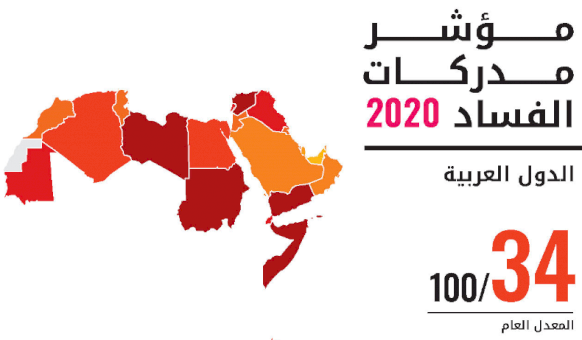
Arab countries scored 34% on the Corruption Perspective Index 2020
According to Transparency International, most of the Arab countries are among the worst locally and globally
Corruption Perspective Index 2020
Ramallah – The Coalition for Integrity and Accountability – AMAN, Transparency International – Palestinian Branch underlined the key conclusions published in the Corruption Perspective Index (CPI) for the year 2020. CPI is published annual to portray the relative potential of corruption in 180 countries and regions around the world. The findings showed that Arab countries scored 34% on this index while two-thirds of the countries covered by the Index ranked below 50% because of weak political will and other problems related to the integrity of governance.
AMAN Coalition confirmed the findings of the Index, adding that the countries with widespread corruption faced serious difficulties in responding to the COVID-19 pandemic. CPI findings confirmed the reverse relation between democracy levels and the spread of corruption since it was observed that corruption spread vastly in countries with a democracy crisis. AMAN Coalition also stressed that most countries without any disaster management systems (legislation, strategies and plans) faced difficulties related to corrupted behaviors, mainly relating to COVID-19 combatting procurement and distribution of aid. Additional observations included conflicts of interest, abuse of power, weak accountability (impunity), authoritarian state, abuse of public posts for personal gains, nepotism in public post, bribery, embezzlement of public funds not to mentions challenges pertaining to the provision of health services. The Coalition also pointed out that the states, which had invested more in the development of their health sector, had lower corruption rates and better response to the challenges created by the pandemic.
Globally, Scandinavian countries (Denmark, Finland and Sweden) as well as New Zealand ranked highest on the CPI with 88%, 85%, 88%, and 85% respectively. These countries enjoy high level of transparency and accountability in addition to open governments, freedom of the press, unrestricted civil society and independence of the judiciary. On another note, AMAN’s donor partners, including the Netherlands, Luxembourg and Norway, ranked among the top ten states on the Index.
On the contrary, Somalia, South Sudan, Syria, and Yemen ranked lowest on CPI and highest on the corruption side, scoring (12%, 12%, 14% and 15% respectively). These countries have civil wars and instability in common, which explains their low ranking. They also face impunity of corruption offenders because of weak state institutions and lack of public freedoms or good governance.
Regarding the Arab countries covered by CPI, the United Arab Emirates ranked the highest and scored 71%; it was followed by Qatar with a score of 63%, then by Oman with 54% and finally Saudi Arabia with 53%.
Considering these findings, the Arab area is facing variant challenges depending on the situation in each state, but they all suffer from issues related to integrity of governance and the need to institute effective and transparent systems that guarantee accountability. The way to achieve this goal is to put an end to political corruption, which is the main factor behind the widespread corruption. Other efforts include an effective political will to fulfill the state’s international obligations under the Sustainable Developmental Goals Agenda.
A quick review of CPI findings around the world shows that Western Europe preserved its ranking with a score of 69%; it was followed by Asia and the Pacific countries, which scored 46%, then the Americas with a score of 43%. As for the Middle East and North Africa, the score was 39%; Eastern Europe ranked 36% while Africa’s score was 32%. It is striking to observe noticeable decline in USA’s ranking, which dropped to 67%. Israel scored 60%.
It should be noted that Palestine has not been covered by CPI for the thirteenth year in a row because of lack of at least three of the thirteen sources of information needed to establish CPI. Another source has been added for the first time this year, which relates to democracy and governance, making the total fourteen sources. It is unfortunate that Palestine lacked the necessary sources although in certain years one or two sources had been available.
CPI resulted in several recommendations: promoting oversight institutions, as response to COVID-19 showed weak oversight and insufficient transparency. This means that states need to have anticorruption agencies and other institutions to oversee public funds and resources, which should enjoy full independence to perform their mandate and ensure that resources are delivered to the neediest without risk of acquisition by corrupted parties. States also need to establish transparent and open contracting procedures in their public procurement. Other recommendations included advocacy for democracy and promotion of the civil society whereby civil society organizations and the media enjoy an enabling environment to hold their governments accountable. Finally, it is important to ensure access to information and dissemination of detailed data on expenditure and distribution of resources, which is particularly important in cases of emergency. These measures guarantee fair and equitable response in addition to compliance with the principles of transparency.
AMAN Coalition will organize a press conference tomorrow to announce the findings of a survey it conducted to measure the perspectives of Palestinian citizens about corruption in Palestine in 2020.
